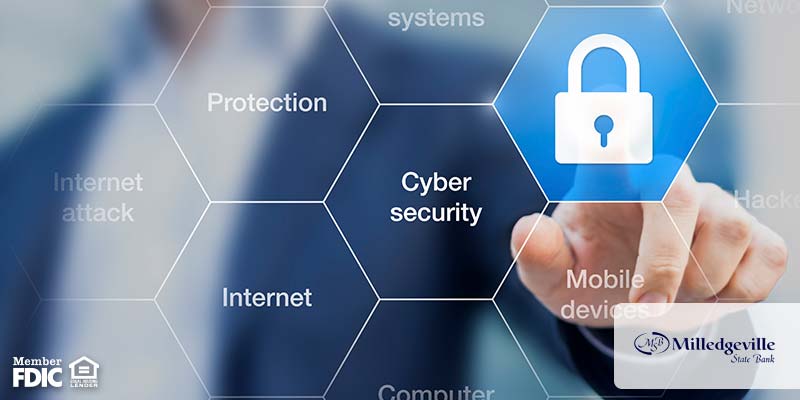
We all know this one – use different passwords and switch them up periodically. While this is a helpful tip to avoid being hacked, there are some questions you may still have on cybersecurity. Luckily, Milledgeville State Bank offers a few answers to your existing questions.
Question: How can I protect my personal information from an attack?
Answer: Be sure that your antivirus program is up-to-date. When it is time to renew that software, do it. Don’t wait around thinking it will be okay for a few weeks. Hackers have more freedom to get your information when anti-virus programs are down. Another tip is to update your WIFI password regularly along with creating a unique network name.
Question: How risky is using public WIFI?
Answer: Even though free WIFI sounds like a great deal, don’t be tempted. Hackers sit waiting for potential targets connecting to public WIFI zones. They have the perfect opportunity to go undetected and gain access to your personal information.
Question: What kind of passwords should I be creating and using?
Answer: Utilize a password that contains letters, numbers and special characters such as @, #, ^, etc. Be sure that everyone in your family uses different passwords with separate logins. This ensures that if one person gets hacked, that other family members’ information can still be protected. Be sure to turn on 2-step authentication wherever it’s available and keep your browser and software updated.
Question: Can a hacker access my webcam?
Answer: Although the short answer is yes, don’t begin to worry too much. As long as you continue to make updates to your software, you should be okay. Cyber criminals focus on drawing you to untrusted sites, having you click on links or download certain items. Once this happens, hackers are able to begin stealing your information or encrypt your data. Some even make you pay a “ransom” to get control of your computer and access to your information.
Question: Is paper the safe option to do business?
Answer: Doing business electronically is perfectly safe if you use the right tools. Paper information can be stolen, lost in the mail or misplaced into the wrong hands. Properly securing your business passwords and information along with keeping it separate from your personal information will help protect your data. Shred any hard copy information you no longer need if you decide to go that route and lock up the important files that shouldn’t be left in the open.
We hope these answers help you understand cybersecurity a little better! Don’t be afraid to surf the web – just stay aware and continue updating your software. Don’t get caught up on the technical terms, just read information from trustworthy sources to better protect yourself!